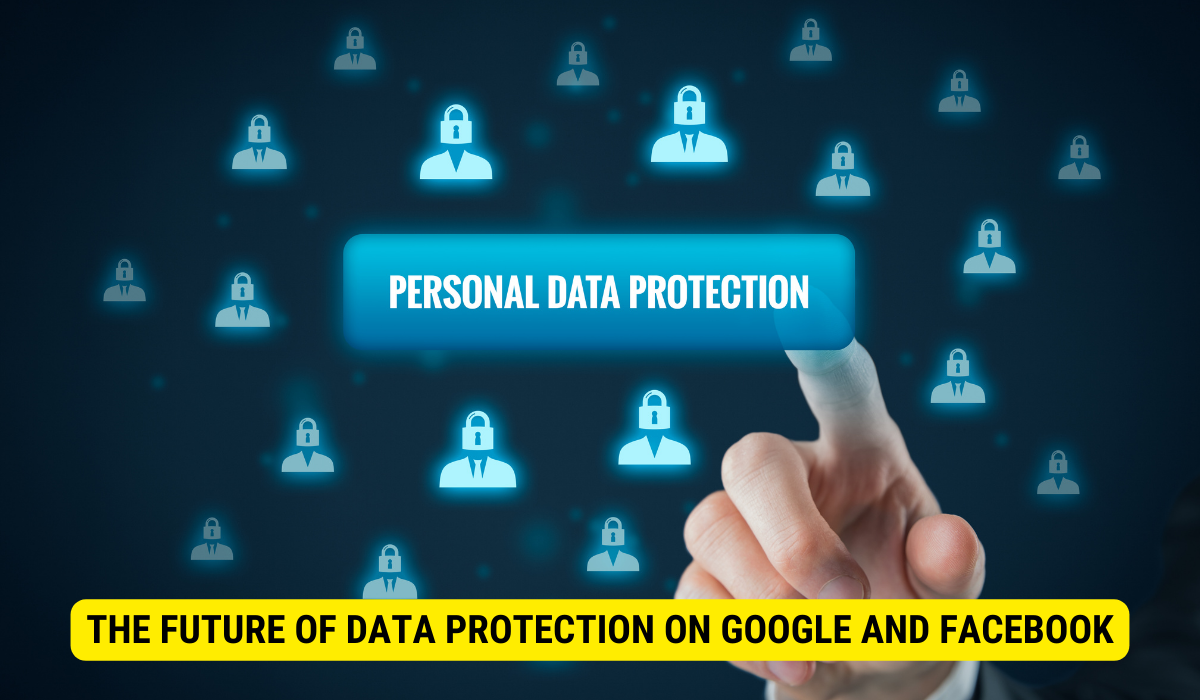Google and Facebook use robust data protection measures, including encryption, two-factor authentication, and privacy policies, to safeguard user data and ensure privacy.
Protecting personal data and privacy has become increasingly important in today’s digital age. With the vast amount of information we share online, it’s crucial to understand how tech giants like Google and Facebook are safeguarding our data. We will delve deeper into the data protection concept and explore the approaches these companies take to ensure our privacy.
Understanding Data Protection
Data protection refers to the strategies employed to safeguard sensitive information against unauthorized access or misuse. This encompasses the implementation of security protocols, encryption methods, and privacy policies to guarantee the confidentiality, integrity, and accessibility of data.
The preservation of data is of utmost importance in contemporary society, as it serves a pivotal function in upholding the privacy and security of individuals’ personal information. In the present era of constant data generation and sharing, comprehending the notion of data protection and its importance in shielding sensitive data is imperative.
The Concept of Data Protection
Data protection revolves around respecting individuals’ privacy rights and establishing trust between users and service providers. It is about empowering users to control and properly handle their personal information.
One of the fundamental principles of data protection is the concept of informed consent. This means individuals should know how their data is collected, processed, and used. Service providers must be transparent about their data practices and obtain explicit user consent before collecting personal information.
Furthermore, data protection encompasses implementing robust security measures to prevent unauthorized access to sensitive data. This includes using strong encryption algorithms, secure authentication methods, and regularly updating security systems to stay ahead of evolving cyber threats.
Why Data Protection is Crucial
Data protection is crucial because it helps prevent identity theft, data breaches, and unauthorized data harvesting. By protecting personal data, individuals can enjoy a safer online experience without compromising privacy.
Identity theft is an escalating issue in the contemporary digital landscape. Perpetrators in the cyber realm perpetually explore avenues to capitalize on weaknesses and obtain illicit entry to personal data. Through the implementation of robust data security measures, entities can substantially mitigate the risk of identity theft, thereby safeguarding individuals from potential financial repercussions and harm to their reputation.
Data breaches have become increasingly common, with high-profile incidents making headlines worldwide. These breaches not only result in financial losses for organizations but also compromise the privacy and trust of individuals. Data protection is crucial in preventing such breaches and ensuring that sensitive data remains secure.
Unauthorized data harvesting is another significant concern in the digital landscape. Many companies collect and sell personal data without the knowledge or consent of individuals. Data protection rules, such as the General Data Protection Regulation (GDPR), aim to address this issue by giving individuals more control over their data and imposing strict penalties on organizations that violate data protection laws.
In conclusion, data protection is a vital aspect of our digital society. It encompasses various measures and practices to safeguard sensitive information, respect privacy rights, and establish trust between users and service providers. By understanding the data protection concept and its significance, individuals can proactively protect their data and enjoy a safer online experience.
Google’s Approach to Data Privacy
Google, one of the world’s leading tech companies, takes data privacy seriously. They have established a robust privacy policy to safeguard user data.
Data privacy has emerged as a significant concern for both individuals and organizations due to the growing dependence on technology and the digital environment. Google acknowledges this issue and has placed a strong emphasis on safeguarding the privacy of its operators.
Google’s Privacy Policy
Google’s privacy policy outlines collecting, using, and protecting user information. They are transparent about the types of data they collect, such as search queries, location data, and device information.
When you use Google’s services, they collect data to provide a personalized experience. For example, they may use your search history to offer relevant search suggestions or show personalized ads based on your interests. However, it’s important to note that Google does not sell personal information to third parties.
Furthermore, Google allows users to control their privacy settings and manage their data. You can choose what information you want to share and what you want to keep private. This level of control empowers users to make informed decisions about their privacy.
Google’s Data Protection Measures
Google employs various data protection measures to keep user data safe. They understand the importance of securing sensitive information and have implemented robust security protocols.
One of the key measures Google takes is encryption. They use encryption to secure data transmission and storage, ensuring only authorized parties can access it. This means that even if someone intercepts the data, they won’t be able to decipher it without the encryption key.
In addition to encryption, Google’s servers undergo regular security audits. These audits help identify and address potential vulnerabilities, ensuring that user data remains protected from threats.
In addition, Google provides a multi-factor authentication system, which adds an extra layer of security. Operators have the option to activate this feature in order to safeguard their accounts against unauthorized access, even in the event of their passwords being compromised. As a result, even in the event that someone obtains your password, they would still need an extra authentication element, like a verification code sent to your mobile device, to access your account.
Also, Google’s dedication to data privacy goes beyond its own services. The company actively collaborates with industry partners, researchers, and policymakers to establish privacy standards and best practices. Their objective is to foster a more secure and protected digital environment for all through collective efforts.
Facebook’s Stance on Data Privacy
Similar to Google, Facebook recognizes the importance of data privacy. They have implemented several measures to protect user data and maintain user trust.
Facebook understands that privacy is a fundamental right, and they are committed to ensuring that user data is handled responsibly. They believe that users should have control over their information and be able to make informed decisions about how it is used.
Facebook’s Privacy Policy
Facebook’s privacy policy outlines how they collect, use, and share user data. They emphasize the importance of user consent and allow users to control their privacy settings.
When you sign up for a Facebook account, you are asked to provide certain personal information. This information creates and customizes your profile, connects you with friends and family, and provides a personalized experience on the platform.
Facebook is transparent about the types of data it collects, which includes your name, email address, date of birth, and location. They also collect information about your interactions on the platform, such as the pages you like, the posts you share, and the ads you click on.
However, Facebook understands that not everyone wants to share the same amount of information. That’s why they allow you to control what information is visible on your profile and who can see it. You can make your profile public, visible to friends only, or customize your privacy settings.
Facebook also ensures transparency by providing users with accessible tools to manage their preferences and control what information is shared with third parties. They give you the option to review and edit the information they have collected about you and download a copy of your data.
Facebook’s Data Protection Strategies
Facebook employs advanced data protection strategies to safeguard user data. They use encryption techniques to secure data in transit and at rest. This prevents unauthorized access and helps protect user information from potential breaches.
When you send a message or share a post on Facebook, your data is encrypted to ensure unauthorized parties cannot intercept it. This means that even if someone were to gain access to the data, they would not be able to read or understand it.
Facebook actively monitors its systems for any signs of suspicious activities and utilizes automated tools to identify and thwart unauthorized access attempts. In addition to this, they maintain a dedicated team of security experts who work tirelessly around the clock to detect and retort to potential threats.
Moreover, Facebook consistently updates its security protocols to stay ahead of emerging threats. This involves conducting routine audits and vulnerability assessments to promptly identify and rectify any weaknesses within their systems.
Furthermore, Facebook has put in place stringent access controls to confirm that only authorized personnel can access user data. They have also implemented multi-factor authentication and stringent password policies to effectively prevent any unauthorized access to their systems.
In conclusion, Facebook is committed to protecting user data and maintaining user trust. They have implemented a comprehensive privacy policy, transparent data collection practices, and advanced data protection strategies to ensure your information is safe and secure.
Common Data Protection Techniques Used by Google and Facebook
Both Google and Facebook employ a range of data protection methods to guarantee the security and confidentiality of user information.
Encryption and Its Role in Data Protection
Encryption is a fundamental data protection technique used by Google and Facebook. It involves encoding data so that only authorized parties can decipher it. This ensures that even if an unauthorized person gains access to the data, they cannot make sense of it.
Encryption is essential for securing data transmission and storage, preventing unauthorized interception and data breaches.
Two-Factor Authentication and Its Importance

Two-factor authentication (2FA) is another vital data protection measure. It adds an additional layer of security by requiring operators to provide additional information to verify their identity, usually a unique code sent to their registered device.
2FA makes it significantly more difficult for unauthorized individuals to gain access to user accounts, even if they possess the password. It provides an additional barrier against hacking attempts and enhances overall data protection.
The Future of Data Protection on Google and Facebook
As technology continues to evolve, so does the need for enhanced data protection measures. Both Google and Facebook are constantly working on improving their data protection strategies.
Upcoming Data Protection Features
Google and Facebook are investing in advanced security technologies and regularly release updates to enhance data protection.
For example, Google is exploring using advanced AI algorithms to detect and prevent phishing attempts, malware, and other cybersecurity threats. Facebook is also investing in AI to improve its ability to detect and remove fake accounts and harmful content.
How Users Can Contribute to Their Own Data Protection?
While Google and Facebook are responsible for protecting user data, individuals also play a significant role in their own data protection.
Users should regularly review their privacy settings, exercise caution when sharing personal information, and enable security features like two-factor authentication. Staying informed about data protection best practices is crucial for maintaining online privacy.
Key Takeaways
- Data protection is essential in the digital age to stop unauthorized access and misuse of sensitive information.
- Google and Facebook have rigorous data protection measures, with encryption a fundamental technique ensuring data remains unreadable to unauthorized parties.
- Two-factor authentication enhances account security by introducing an added verification step.
- Both tech giants continually innovate and update their data protection methods, including potential integrations of advanced AI algorithms.
- Users are responsible for protecting data by actively managing their privacy settings and staying informed about security best practices.
FAQs
What is the purpose of data protection?
Data protection safeguards sensitive information from unauthorized access or misuse, ensuring confidentiality, integrity, and availability.
How does Google protect user data?
Google uses encryption for data transmission and storage, offers multi-factor authentication, undergoes regular security audits, and allows users to control their privacy settings.
What measures does Facebook employ for data privacy?
Facebook implements encryption techniques, monitors systems for suspicious activities, updates security measures regularly, and empowers users to control and review their data.
What is two-factor authentication?
Two-factor authentication is a security measure requiring users to provide an additional verification step, typically a unique code sent to a registered device alongside their password.
How can users enhance their own data protection on these platforms?
Users should routinely examine and modify their privacy configurations, employ two-step verification, and exercise prudence when disclosing personal data.
Conclusion
In conclusion, Google and Facebook have implemented comprehensive data protection measures to guarantee the privacy and security of user data. By means of their privacy policies, encryption methodologies, and consistent security enhancements, these technology giants strive to create a secure and dependable online atmosphere for their users. Nevertheless, it is equally crucial for individuals to remain watchful and actively participate in safeguarding their data by embracing secure habits and comprehending the features at their disposal.
